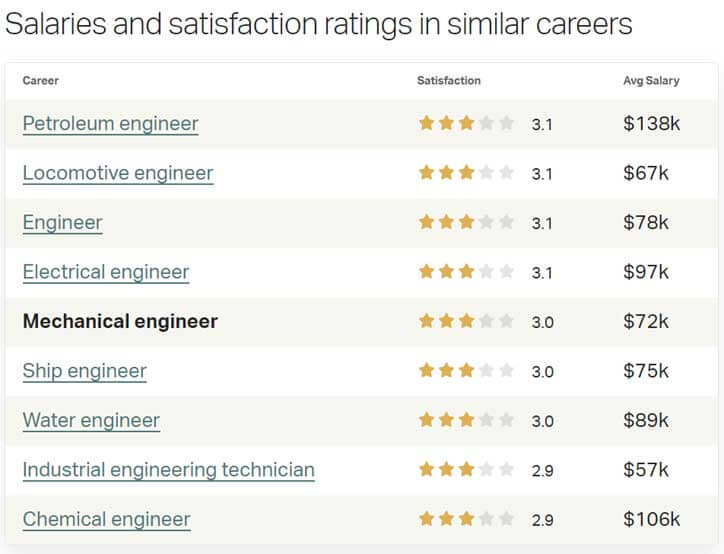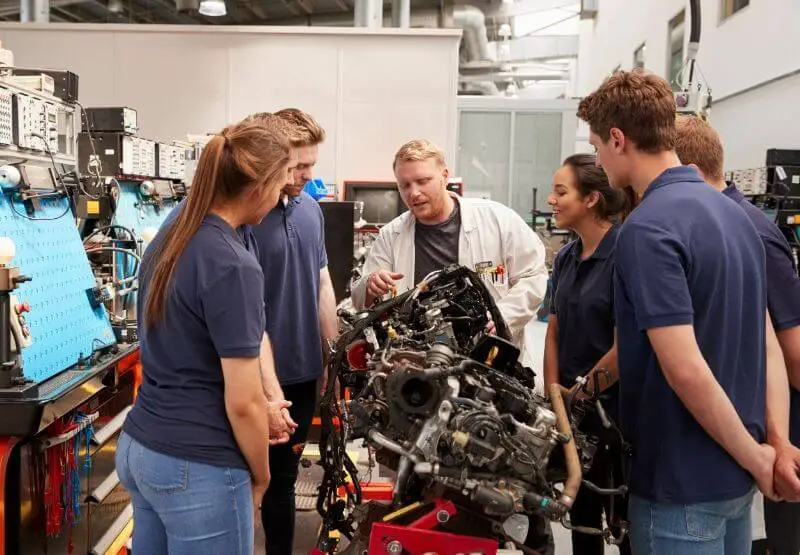Mechanical engineering is a field that involves the design, development, and manufacturing of mechanical systems and machines. These machines can range from small devices like medical equipment to large structures like power generation plant. Mechanical engineers play a crucial role in ensuring that these machines function efficiently and safely.
Mechanical engineers work in a variety of industries, including aerospace, automotive, manufacturing, and energy. They use their expertise to design and develop products, improve existing systems, and solve complex problems. Some of the typical job duties of a mechanical engineer include designing and testing prototypes, analyzing data to improve performance, and collaborating with other engineers and professionals.
If you are interested in pursuing a career in mechanical engineering, there are many different paths you can take. From designing new products to managing manufacturing processes, there are a wide range of job opportunities available. This comprehensive guide will provide you with an overview of the different types of mechanical engineering jobs, the skills and education required for each position, and tips for finding the right job for you.
Introduction to Mechanical Engineering
Mechanical engineering is a branch of engineering that covers design, construction, operation, maintenance, and machinery utilization through the application of physics, mathematics, materials science, and engineering principles to provide a service and improve quality of life. This field of engineering came into existence after the industrial revolution that took place in the 18th century.
Mechanical engineering is considered the most diverse as compared to the rest of the engineering disciplines. It plays a vital role in the transportation industry (automotive, aerospace), health industry (biotechnology, prosthetics), electronics industry (computers, microchips, disk drives, printers, semiconductors), and manufacturing industry (robots, automation machines, wind turbines, fuel cells, and compressors).
Mechanical engineering is concerned with designing, building, running, and operating the different devices, tools, and machinery used in these industries from start to finish. Mechanical engineering products can range in size from small machinery such as Nano-robots and miniature connectors to huge ones such as airplanes, rockets, and power plants. As you might have figured already, Mechanical Engineering overlaps with multiple engineering fields such as manufacturing, metallurgical, civil, chemical, electrical, aerospace engineering, etc.
What does a Mechanical Engineer do?
Mechanical Engineers identify problems, analyze them, devise means, and utilize mechanical devices that might help solve the problem. These problems can be design problems that require redesigning, prototype testing that needs to be approved and feasible for implementation, and manufacturing or industrial processes alterations that would improve quality and efficiency.
In order to achieve these tasks and handle different problems, certain tools are usually used by mechanical engineers, such as 3D design software, simulation software, mathematical modeling software, and different software used for different purposes.
For example, let’s say that you are a mechanical engineer working in the field of transportation. You will be responsible for improving the engine’s efficiency of the vehicles used. This can be achieved by optimizing the vehicle’s fuel ignition, transmission, suspension, aerodynamics, etc. You can also be a mechanical engineer working in the field of heating and cooling systems. You will then be responsible for maintaining and improving the heat exchange system by minimizing energy losses.
You can be a mechanical engineer working in the field of robotics. You will then be responsible for designing, building, and running a robot that would provide service and perform a human task more efficiently. You can also be a mechanical engineer specializing in material engineering, studying the mechanical, chemical, and electrical properties of different elements and materials to develop new material with the desired mechanical properties.
What is the kind of workplace that Mechanical Engineers work in?
Mechanical Engineers usually work in research and development, engineering services, and manufacturing industries. The workplace depends on the type of work a mechanical engineer is conducting. However, they usually work in an office-like environment with occasional visits to sites if their presence is needed.
Types of Mechanical Engineering Jobs
Mechanical engineers work in a wide range of industries such as automotive, aerospace, construction, electronics, chemical, consumer goods, defense, marine, materials and metals, pharmaceuticals, rail, textiles, utilities, etc. All of these industries have room for innovation, and hence a mechanical engineer can work in. Besides, mechanical engineers can work in non-engineering-related jobs such as management, finance, law, military, technical sales, medicine, research, technical consulting, journalism, teaching, etc.
Educational Requirements for Mechanical Engineering Jobs
In order to become a mechanical engineer, you have to obtain a Bachelor’s degree in Mechanical Engineering. This will involve studying math, physics, life sciences, engineering, design, material courses, etc. A Bachelor’s program usually lasts about four years, depending on the country you obtain your degree from. If you seek a faculty engineering position in higher education, you will have to obtain a graduate degree in an engineering field.
Some students go for MBAs, and others go for Master’s degrees in their engineering field of interest in order to broaden their expertise and skills. Many, then, become managers and administrators for companies and startups. In order to be able to teach at universities as a professor with an engineering background, you have to obtain a PhD. Degree in a specific field and then apply for faculty positions at universities.
Skills required for a Mechanical Engineering job
Mechanical engineers enjoy tackling different problems and devising innovative solutions that would help improve a process or machine’s efficiency. They are interested in the latest technological innovations, and they are strong analytical thinkers. They should possess good communication skills to be able to explain and clarify the functionality of the process or machine to the client, who is usually not aware of the mechanical engineering terminology.
Mechanical engineering also involves lots of teamwork and brainstorming sessions that require collaboration between different people. Hence, leadership and teamwork skills are vital for a mechanical engineer. Successful mechanical engineers need to possess a specific list of necessary qualities to excel in their careers. This list includes, but is not limited to, problem-solving, analytical thinking, creativity, proactivity, meticulosity, leadership, teamwork, communication, math, and computer skills, efficient work under pressure, troubleshooting, and much more.
Like in any other field, gaining work experience and good academic success is the key to achieving a competitive job offering. Therefore, it is recommended that throughout the academic course of studies, you focus on getting good knowledge as we as good grades.
During the years of study, it is highly recommended that you gain real work experience during the summer. So, is that it?! Good grades and work experience! No, it would be best if you also stay updated and aware of the latest technological changes and breakthroughs. One more thing, it is highly recommended that you build network friends and employers during your studies and internships to help you land a competitive and exciting job quickly after graduation. It is all about networks, reputation, and previous work experience.
If you successfully achieved those main factors during your studies, you will easily find a competitive job offer with a relatively high salary. These factors are essential if you plan to work as a mechanical engineer in a technical field and plan to apply for an academic engineering career or if you are managing a project or providing consulting services to clients.
Career Path and Salary of a Mechanical Engineer
Mechanical engineers’ salaries vary from country to country, from city to city, and from company to company. In the United States, mechanical engineers earn an average annual salary of about $73,000, with a minimum of $47,000 and a maximum of $112,000.

Industry Trends and Future Job Outlook
Due to the working flexibility of mechanical engineers and a wide range of industries in which a mechanical engineer can work, you can find them get employed relatively quicker than other fields. According to CareerExplorer, mechanical engineers have a ‘C’ rating of employability, which is an average rating indicating equal and moderate employability as most other jobs.
What is it like being a mechanical engineer?
This will vary depending on the field you are working in. Nowadays, computers and software have changed the way problems are calculated and solved, making them more accurate and less time-consuming. However, mechanical engineers still need to be aware of the mathematics and engineering principles upon which the software is built. In the end, the software is just a tool that can output wrong outputs if used wrongly.
Mechanical engineers do not always handle the technical details and spend time working on machines holding a calculator in hand. As a mechanical engineer, you can manage businesses, handle contracts, design machinery, solve issues and problems, invent novel techniques, etc. It is an extremely broad field that gives you the potential to work in various areas and be successful because of your analytical and problem-solving skills.
A day in the life of a mechanical engineer can hence be different from one mechanical engineer to another. For example, as a mechanical engineer specialized in designing equipment, you will probably spend most of your day using software that develops and tests 3D models. If you are a project manager, you will conduct or analyze feasibility studies for the project, ways of improvement, potential risks, and alternatives. If you are a faculty mechanical engineer, then you are going to spend most of your time teaching college students about a specific subject of mechanical engineering such as statics, dynamics, the strength of materials, etc. and the rest of your time conducting research and studies on new inventions or techniques that can be followed to provide a unique service or improve the efficiency of a current process.
Are mechanical engineers happy?
As you might have guessed, mechanical engineering is not an easy career path; it requires dedication, effort, and time. You are usually missing out on friends’ hangouts after working hours, leisure activities, and trips. Besides, they do not usually take competitive salaries than other fields like electrical or computer engineering. It all depends on the country, city, and company you are working at and the supply and demand market movement for mechanical engineers.
In general, mechanical engineers are ranked among the least happy careers, with an overall rank in the 43rd percentile of career satisfaction scores. This rank is below average. These outcomes are based on a survey conducted by CareerExplorer, who surveyed millions of mechanical engineers about their satisfaction and happiness with their careers. The survey outputs indicated that mechanical engineers rate their career happiness as 3 out of 5 stars. This puts mechanical engineers in the bottom 33% of careers. To better understand the whole picture, mechanical engineering satisfaction and happiness scores are compared to those from other disciplines.

Conclusion and Final Thoughts
In conclusion, mechanical engineering is a challenging career choice. However, if you have the passion and characteristics that shape a mechanical engineer, then you should go for it. As a mechanical engineer, you will have the capability to understand and perform various tasks, ranging from highly technical assignments such as designing and manufacturing Nanorobots to project management and handling clients’ requests.
It is a story of love and hate. You know that you enjoy exploring the exciting and innovative ideas behind almost everything we use in our daily lives, making you fall in love with it and have a passion for inventing and implementing something yourself that would affect lives and benefit people. However, on the other hand, you are usually not paid enough. It requires lots of time and dedication and effort, and hard studying that might drain your energy and leave you with less social life than other disciplines. However, I need to mention that it is always up to you to balance your social life and career.
Being a mechanical engineer can be your life and source of happiness and enjoyment. You also do not need to become the best mechanical engineer that ever existed; you can be a good mechanical engineer who balances his leisure time and work and achieves his inner happiness. You will spend most of your life and time working, almost equal to the time you spend sleeping, so you might as well do something that you would enjoy and pushes you to become the best version of yourself.
References:








